CHICAGO BLUES
Bless neighbourhood supermarkets, smite on-demand grocery deliveries
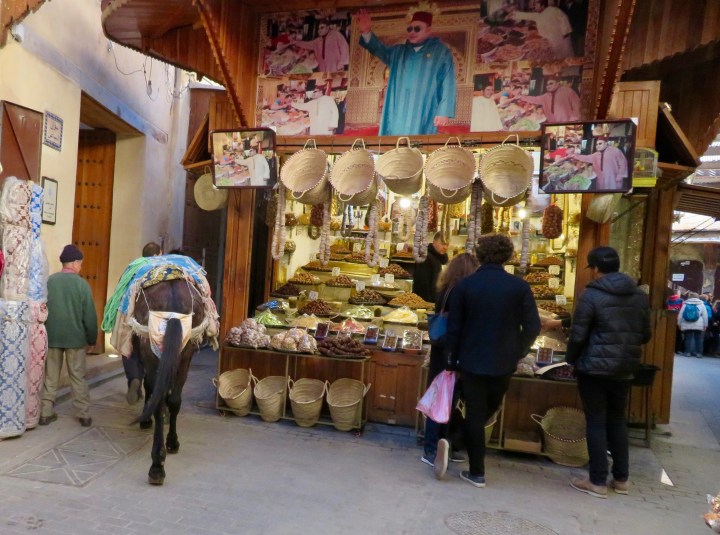
Negotiating the world of American supermarkets can be daunting. The peculiar thing is, they have no variety. Just lots of the same, labelled differently. In a way, they are true reflections of American society.
Uprooting and moving to a new country can be hard on the digestion. Travelling for just a few weeks is a lot different, unless you eat stupidly, of course. At least you know that you will be returning to the familiar at some point in the near future.
But knowing THIS IS IT, I’m not going back, ever, is another ballgame altogether. No more Woolies or Pick n Pay. I was plunged into the strange new world of foreign supermarkets. Art museums, no problem. It just never occurred to me that food shopping could be an issue. It’s something you generally just don’t do as a tourist. I got into the habit of stopping off for a glass of something to fortify myself before hitting the dreaded aisles. Unfortunately, dagga never agreed with me so I couldn’t get stoned and hit the aisles with a little buzz going. Probably a good thing.
Being an Afrikaans boy from the wrong side of Pretoria didn’t help. I stopped asking the staff about the whereabouts of normal stuff because I couldn’t understand them and they couldn’t understand me. To my surprise, American was not like English at all. Plus, I didn’t know the brand names. Americans are big on brand names. Also, when Americans figure out that you’re foreign, they start talking really loudly. Don’t shout, I’m not bloody deaf, I’m foreign. Speak slowly, enunciate clearly, and turn down the volume. Not that people were unfriendly, they just couldn’t figure out that we were dealing with a cognitive problem and not a hearing deficiency.
But forgeddaboudit, as they say in New York. I started relying on my own instincts. Most of the time things worked out well, and then sometimes, not so well. Trial and error, kind of thing.
Speaking of going to the supermarket with a buzz going, I remember going to one in Stellenbosch in the early Eighties with my old friend and grandaddy of South African punk, Guillaume Rossouw, aka Gill Gap, formerly of the Safari Suits and Housewives Choice. We were doing some kind of show there that starred Bo Peterson and Marcel van Heerden that I have absolutely no recollection of. To cut a long story short, Guillaume and I spent one night on some hilltop vineyard after snorting or smoking or inhaling some mystery substance and then early the next morning somehow found ourselves in a supermarket in downtown Stellies, in desperate need of some Tassies. Well, we had our Hunter Thomson moment, I suppose. How privileged we were. Our white skins probably saved us from doing some time behind bars. Since those days I tend to stick to stuff that comes in a bottle and has a label clearly stating its date and place of origin.
Anyway, back to my early Chicago days trying to negotiate the world of American supermarkets. And they can be daunting, even at the best of times. Unless you’ve been in one, I don’t think it’s possible to grasp their sheer scale. But the peculiar thing is, they have no variety. Just lots of the same, labelled differently. In a way, they are true reflections of American society. Despite American claims of regional diversity, once you venture outside the big cities, there’s a sameness, no matter where you go. Whether it’s the deep South or the upper Northwest, supermarkets are the same, petrol stations are the same, restaurants are the same. Blandness everywhere. Even the angry white dudes in their pickup trucks are the same. Some states just have more of them than others.
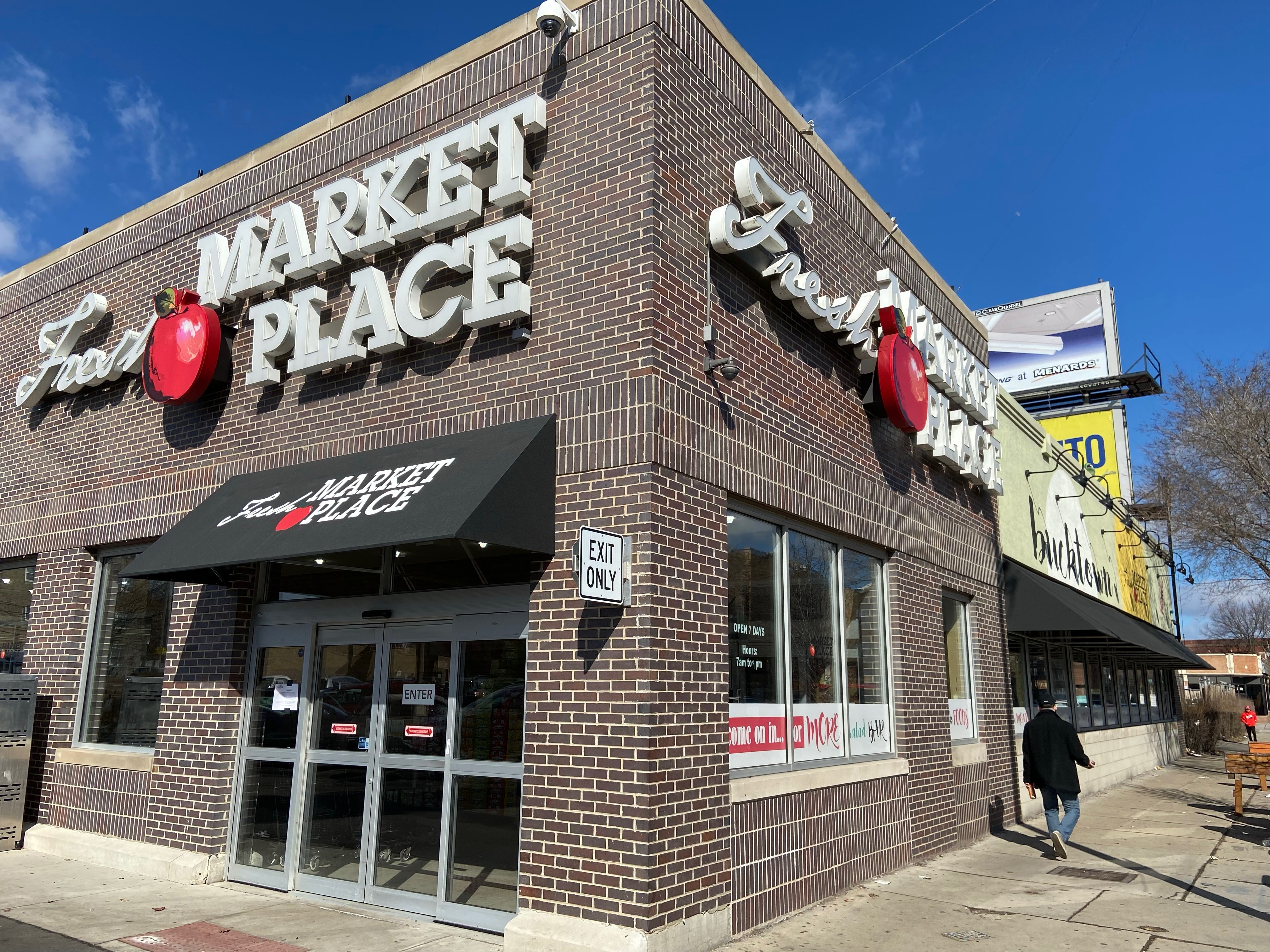
Endangered species: Family-owned market where I shop every day. Photo: Chris Pretorius
The big cities are different because they have an ethnic diversity lacking in the rest of the country. And Chicago is actually considered the city with the most diverse and intact small ethnic neighbourhoods, all with old family run grocery stores, butcher shops and bakeries. And the variety of goods they stock is amazing. For instance, Americans don’t really eat lamb but the butcher at my neighbourhood market has the most amazing free-range grass-fed lamb that he gets from a small farm in southern Illinois. Same place I get my Spanish turkeys from. A few days ago I went looking for English mustard to make Welsh rarebit. The little market I went to had about 50 times more types of mustard than any of the big supermarkets. I was amazed. So nowadays I hardly ever see the inside of big supermarkets unless I need to buy bulk items like toilet paper.
After all these years, supermarkets still fascinate me, even when we travel. Not the big ones that you usually see next to the highway on the way into the city from the airport, but the small inner city ones. The first thing I do when we arrive in a new city is find the nearest neighbourhood supermarket. This drives my wife completely nuts. We’re in a foreign city on vacation and I want to go grocery shopping. What’s wrong with me!? Well, my interest in supermarkets was sort of rekindled after Willem was born. We travel quite a bit and realised that, with a new addition to our family, shopping for and cooking our own meals made things a lot easier and cheaper. So we basically stopped staying in regular hotels and I started food shopping in foreign supermarkets.
After some research we discovered that there were lots of self-catering hotel chains all over Europe that are usually more centrally located and cheaper than most Airbnbs. No crappy Airbnb surprises to spoil your trip. And I just hate that personal thing of having to greet and be friendly and chatty to some complete stranger while they’re handing me a key to their apartment. At least in self-catering hotels there is a check-in counter between me and the person handing me the key. The whole transaction happens on an impersonal level that suits me absolutely fine. I really find it hard to relax knowing I’m staying in somebody else’s apartment and constantly being nervous that Willem is going to destroy something or I’m going to burn the kitchen down. Or block the toilet. Self-catering hotels have a management structure in place that you can complain to when the toilet gets blocked.
Staying in one in Cologne a few years ago, we kept setting off the fire alarm. Like, four times in a row. And I had no problem not feeling guilty about the maintenance guy knocking on our door four times in a row. That’s what he gets paid for. It turned out that the stove was one of those bloody induction things and I kept putting grocery bags on it. The stove didn’t like that and kept sounding the alarm. How was I to know? Actually the feeling was mutual. I hated that stove right back. The first morning I fried some eggs and had the pan slightly off the ring indicating the hotplate. The eggs inside the ring were perfectly cooked but outside the ring they were completely raw. What kind of moron would want to cook on that? Give me a gas burner any day.
I am digressing, but across the road from our Cologne hotel was one of the most famous toy shops in Germany. Willem was nine at the time and I love model airplanes so it was an obvious daily destination. The only problem was that it was flanked by two porn shops. And they were not trying to be discreet or blend into the neighbourhood. Their window displays were all brightly coloured sex toys and flashing lights. (What’s the deal with technicolour sex toys anyway?) So to get to the actual kiddie toy shop in the middle, Jill and I had to do a whole song and dance routine to distract Willem. I suspect our distraction act had more to do with not having to answer awkward questions at ten in the morning than protecting our child’s innocence.
And I found the neighbourhood supermarket kind of nondescript and bleak. The lady behind the deli counter was downright mean. Jill and Willem couldn’t decide on which salami to get and asked her for a taste. Here in the States that’s just what you do and everybody is happy to oblige, but the deli lady in Cologne looked like she was going to have a stroke. Or call the cops. I would have ended up in a yelling slugfest with her but Jill just smiled and charmed her into reluctantly giving them a taste. Learning experience for me with my South African self-righteous temper. The interesting thing was that the supermarket pretty accurately reflected our feelings about Cologne as a whole.
As a matter of fact, that experience ranked up there with one we had in the Centurion Pick n Pay in Pretoria. We were standing in line waiting to check out. Willem was about five at the time and full of curiosity about all the strange stuff around him and kept asking what things were. Being from Chicago, both he and Jill spoke American, of course, so the two elderly white ladies behind us thought they were safe making nasty comments about him. “Die kind is heeltemal uit sy kassie uit, en kyk net daai ouers, kan hulle nie die blerrie kind inhou nie? Regte klein Amerikanertjie,” said the one. And off they went in Afrikaans. In all our travels I had never experienced such blatant and smug meanness. After we checked out I turned around and wished them a nice day in Afrikaans. So what does that say about my hometown?
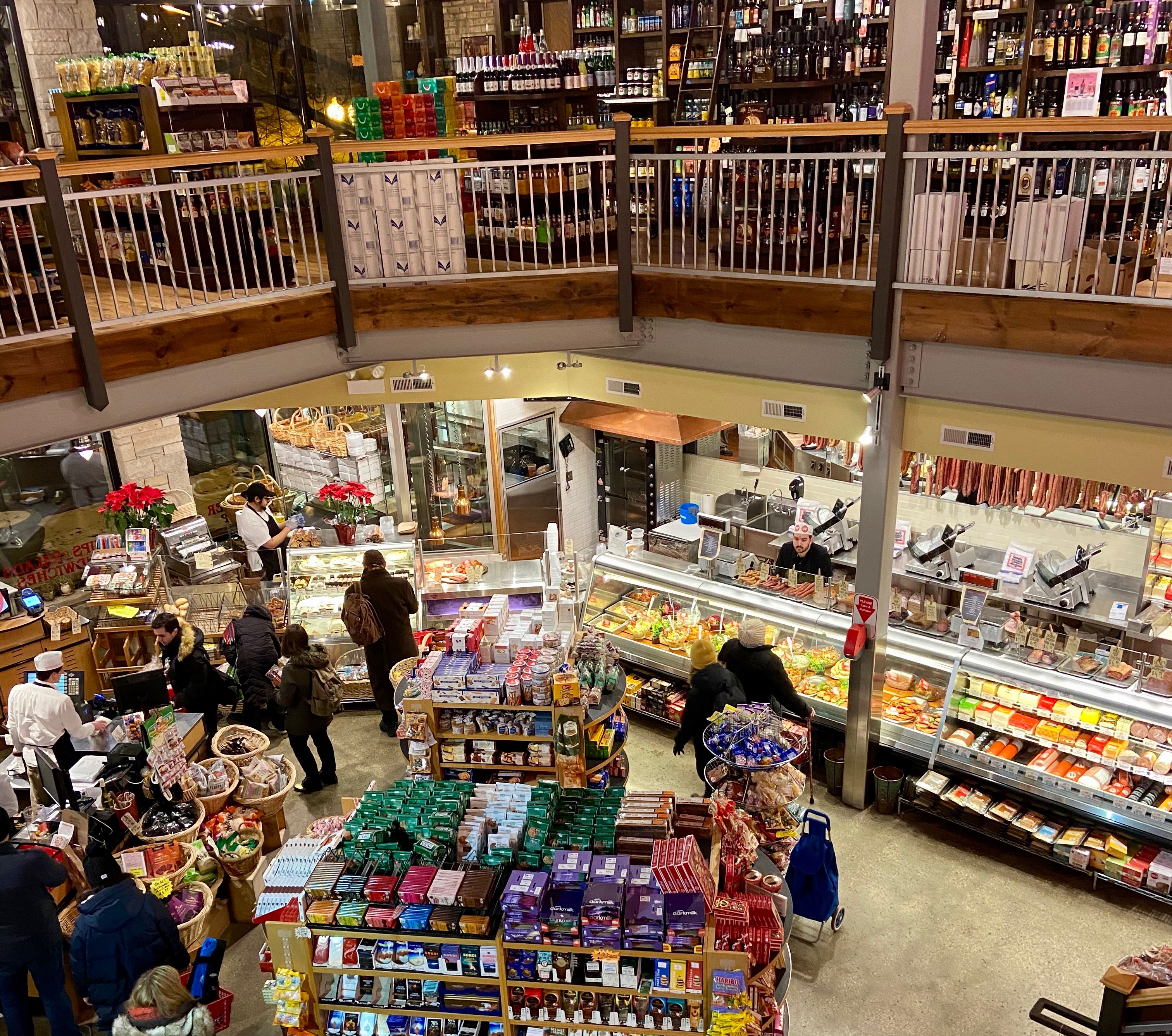
Polish market near me. Photo: Chris Pretorius
I feel I can get the pulse of a city much more accurately in the local supermarkets rather than in the art museums. For instance, I found supermarkets in Berlin totally disorderly. Boxes on the shelves were open with stuff taken out of them and things were lying around on the floor. There was no point in asking for stuff because nobody knew where anything was. And if you asked for a piece of cheese or something the person behind the counter would get totally flustered and take 30 minutes to cut and wrap it. Yes, Berlin. And those supermarkets confirmed a sneaky suspicion I had that under the surface in Germany lurked chaos.
In a supermarket you can feel the texture of a neighbourhood. Sitting at a sidewalk cafe and watching people go by is not the same. Everybody is on parade. Everybody is all dressed up and posing. In the neighbourhood supermarket they let their guard down. People don’t dress up to go supermarket shopping. I’ve seen people shopping in their pyjamas. And tourists generally don’t go there. You can also look in people’s shopping carts and see what they really cook for dinner. And find interesting ingredients for your own dinner.
In Paris I once bought one of those famous Bresse chickens. Sure, it was expensive, but it would have cost 20 times more if you ordered it in a restaurant. They sold it with its blue feet still attached so you could tell it was the real deal. I roasted it with salt and pepper and it was delicious. In Lisbon there just weren’t enough evenings to work my way through the mouthwatering array of sausages from the little supermarket around the corner. In Amsterdam it was Gouda cheese. The local supermarket had the biggest cheese counter I’ve ever seen and all of it aged Gouda. There are touristy cheese shops all over Amsterdam, but this was where the neighbourhood people bought their cheese and it’s true, the Dutch love cheese.

Fruit and veggies at my local. Photo: Chris Pretorius
A couple of years ago we stayed in Vredehoek in Cape Town. My first thought was to stock up at the big Gardens Centre Pick n Pay until someone suggested the Vredehoek Spar. It was small but it had character and was certainly the best-stocked supermarket that I’d come across in South Africa. And that said something about Vredehoek to me.
I can carry on and on about independent neighbourhood supermarkets but I should probably get to the point. Last Sunday while I was staring out the front window, two delivery vans pulled up in front of the apartment building next door, literally within 15 minutes of each other. One was from AmazonFresh and the other from Instacart. Both on-demand grocery delivery services. They have deals with big supermarket chains and all you have to do is open an app and they deliver within two hours. And like Uber, the delivery people are independent contractors. The markup on the groceries is not much because these services have to remain competitive so one wonders how much these poor delivery people make. They basically spend their days running because the more deliveries they can fit in, the more money they make.
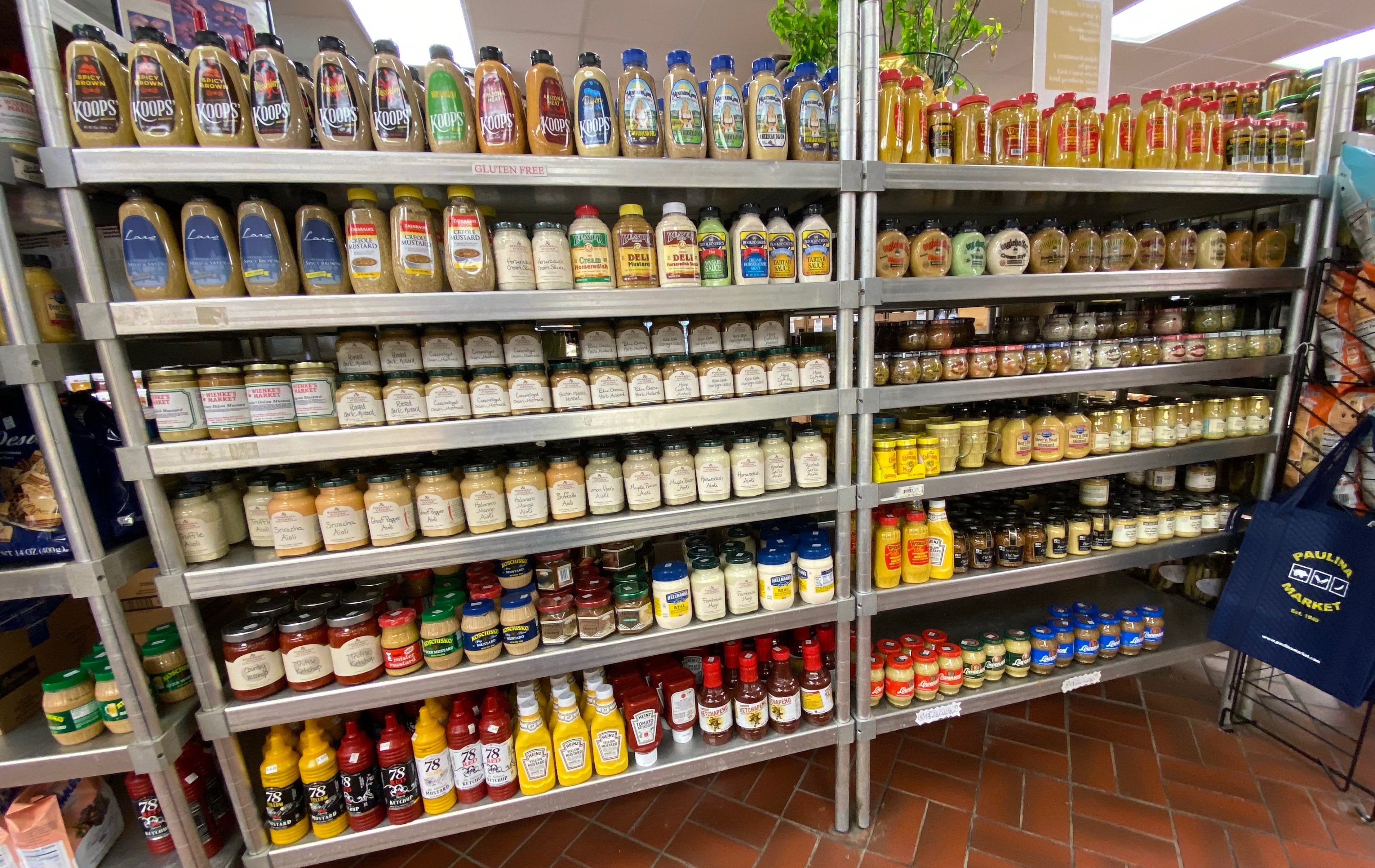
Mustard selection at nearby German market. Photo: Chris Pretorius
The sad thing is, these services are very popular with younger people, according to a New York Times survey. Fewer and fewer of them bother to walk to their neighbourhood markets for groceries. And as rents go up and shoppers dwindle, these markets are disappearing, even in Chicago. As these little microcosms of their neighbourhoods vanish, so does a vital part of the urban landscape. Amazon did a great job shutting down independent bookstores. Now they’re starting on independent supermarkets. It’s happening all over Europe as well. According to the BBC, small French bakeries are shutting down in droves.
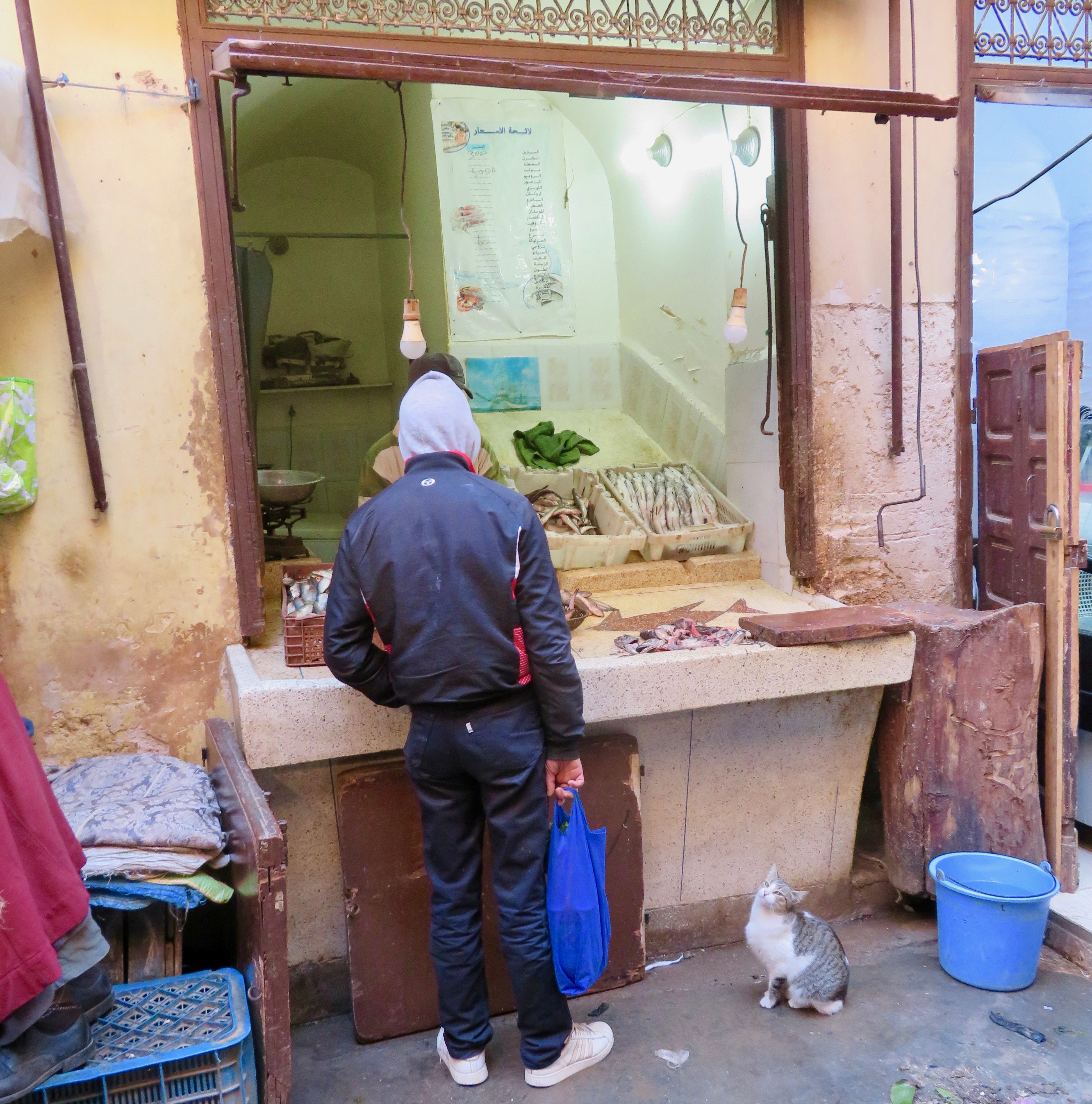
Fish shopping in the Fes Medina. Photo: Chris Pretorius
Ironically, we were in Fes, Morocco, a couple of months ago and spent most of our time wandering round the Medina, or old city. The souks, or markets in the Medina are some of the oldest continuously-operating ones in the world. Thinking back now I realise we were in one of the world’s original supermarkets. The Fes Medina is the world’s largest pedestrian-only urban area and life in the Medina revolves around the souks. Unlike the carpet or ceramics stalls, the souks are where the locals shop, exchange news, gossip, or just hang out, and are basically tourist-free. Unfortunately we didn’t have a kitchen where we stayed, so all I could do was gawk and take pictures. Unesco and the Moroccan government have launched a huge programme to keep the integrity of the Medina intact while preserving it for a few more centuries, at least.
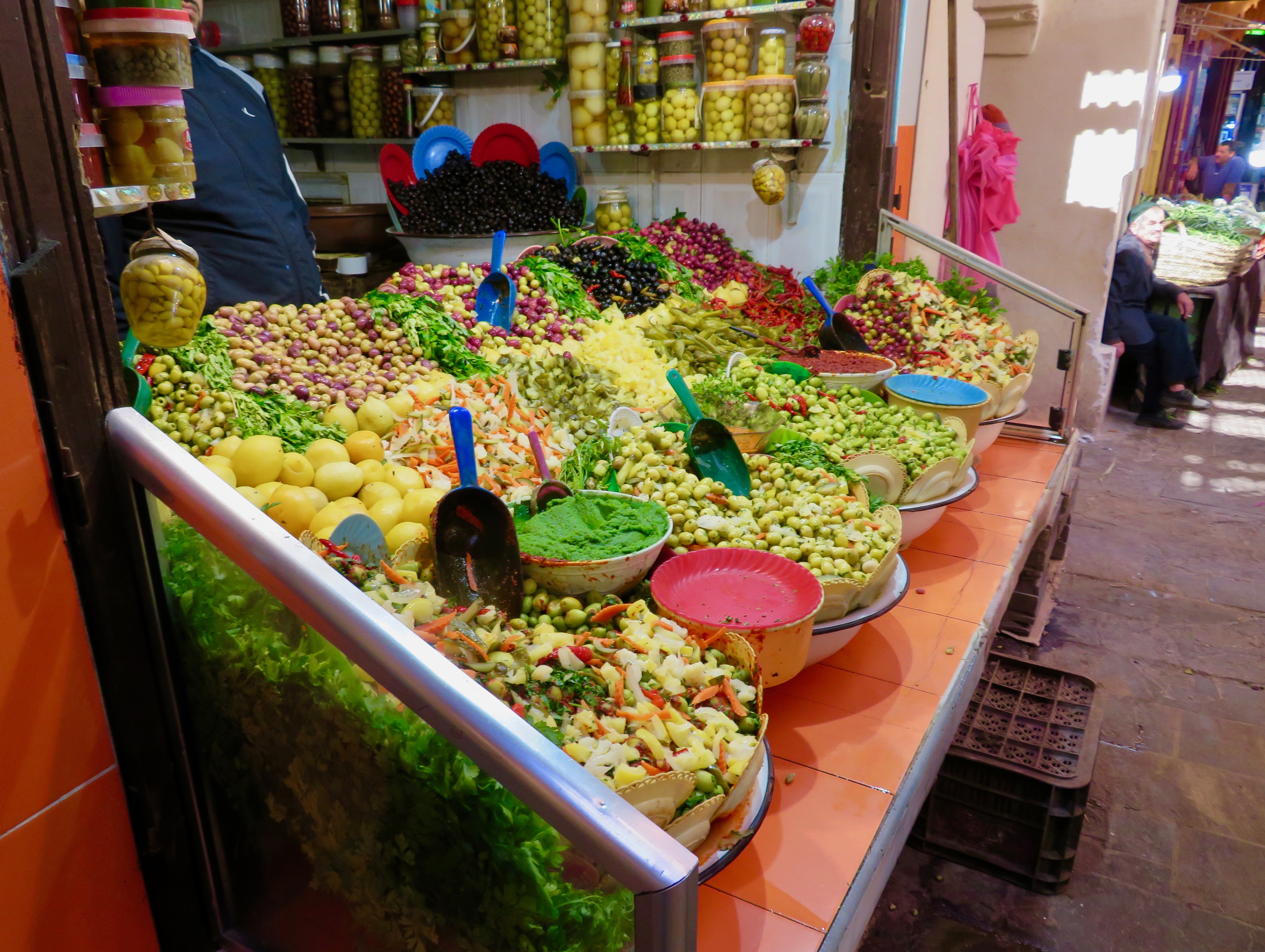
Olives, Fes Medina. Photo: Chris Pretorius
I said “ironically” because it seems that the thousand-year-old souks in the Medina will end up outliving all the little neighbourhood markets. Wouldn’t it be great if Unesco were to declare them world heritage sites, but that’s not going to happen. Maybe some god like Mercury will swoop down and smite AmazonFresh, but that’s not going to happen either. In the meantime, I’ll do my bit and enjoy them while they last and stay away from the big chain supermarkets. And pretend I don’t notice the delivery vans out in the street. DM





 Become an Insider
Become an Insider